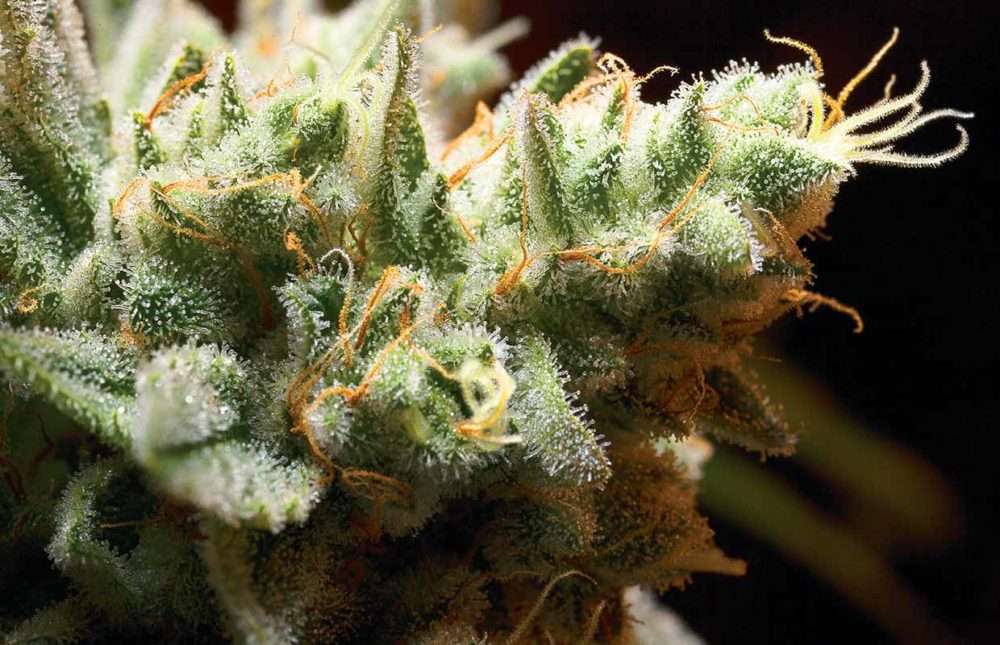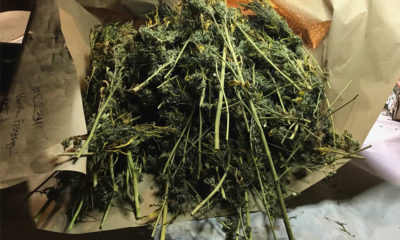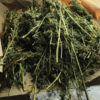Gabriel: An OG Lives
One Washington cannabis brand has survived the legal battles of prohibition and remains today, fighting high taxes and focusing on growing quality bud.
Times have changed for journalists reporting on cannabis brands. Years ago, writing (and by extension reading) about cannabis cultivators felt like following the wild lives of outlaw herbalists, mad bastards who risked it all for the love of the plant and the thrill of the game.
Today? It’s undeniably exciting to witness the still-building groundswell of mainstream cultural acceptance and political momentum for national cannabis legalization, but it’s hard to shake the feeling that much of the cannabis media has gone from following the adventures of Robin Hood thumbing his nose at authority from a deep forest hideout to analyzing the market impact of the Sheriff of Nottingham’s latest tax demands.

But this story, the story of Gabriel Cannabis, is actually the happy ending of another story — the kind of story that used to get told in cannabis magazines with great frequency: the tragicomic saga of the medical cannabis trailblazer. In this case, one who went from patient provider, to dispensary operator, to head cultivator for one of Washington state’s premier cannabis brands at the genesis of a new adult-use system.
Enter Bryan Gabriel, majority owner and head cultivator at Gabriel Cannabis, who is also a living link between the outlaw past, hyper-regulated present and uncertain future of cannabis commerce in the Pacific Northwest. He’s a businessman running a commercial enterprise in Washington’s regulated market, but 10 years ago, he was one of those mad bastards growing and selling cannabis at the bleeding edge of the law, and he undoubtedly paid a price for it.
Up from the Underground
The sharp, contemporary aesthetics of Gabriel’s packaging today fit in perfectly with the increasingly commercial vibe of the market, which belies a deep connection to the early days of legal cannabis and the spirit of herbal healing. The cannabis inside the jar, on the other hand, is obviously the product of a skilled cultivator with years of experience and a deep love for the plant.
That love affair began with a tragedy. When Gabriel’s grandfather died from cancer in 2004, Gabriel and his brother Josh discovered the cannabis plants their grandfather had been growing and smoking to manage his pain. Gabriel, who already loved to grow plants and vegetables, felt a spark inside, one that would start a fire a few short years later, around 2006, when he started cultivating cannabis.
In 1998, Washington voters approved Initiative Measure 692, which approved a caregiver/patient system for distributing legal medical cannabis. It also laid the groundwork for Gabriel’s journey. By 2006 when he started growing, many people still didn’t fully understand what was actually legal when it came to medical cannabis, but he definitely did.

“RCW 69.51A — I memorized the whole thing so I could say it to the police,” he says. “The cops didn’t even know what I was talking about, so they went and looked it up.” But, he adds that the police were not especially swayed by whatever they found during their search. “Basically, in 2009, I was arrested for three felonies,” he says.
Gabriel’s battle with King County, which comprises Seattle and its outlying areas, is a matter of public record: The Snoqualmie Police Department decided Gabriel was a drug dealer and not a legitimate medical provider. Prosecutors for King County filed two separate sets of charges against him. One was dismissed, but the other went to trial and resulted in a hung jury. The judge ordered the police to return the 280.55 grams of medical cannabis they had seized from Gabriel, an order they first refused but ultimately complied with.
The case that went to trial was one of the first legal tests of Washington’s medical cannabis law, and its favorable conclusion for Gabriel ultimately helped open the door to a more permissive interpretation of the law that allowed for dispensaries.
“They tried to get me to plea, but we went to trial — nobody was fighting medical cannabis cases and mine opened up a lot of other cases,” he says. “The case law really opened up a lot of loopholes.”

Gabriel’s name was already out there in relation so to medical cannabis, so when a change in the law finally created a legal gray area for dispensaries to operate in Washington, he decided to get involved, opening The Healing Center Organization (THCO) in Seattle in 2011.
“There was one dispensary open forever that only helped veterans, and they were the very first, but THCO was one of the first [Seattle dispensaries] to be open to the public,” he says. “I knew it was the right thing and I didn’t have kids or a family at the times, so I could do the right thing for cannabis and was ready to go to prison if I had to.”
Gabriel was passionate about providing quality cannabis to Seattle, but when he looked at the already-shifting sands of cannabis commerce there, he realized that the best way he could do that was to follow his natural passion for cultivation.
With that decision made, Gabriel formed the company of the same name in 2014 with people close to him: his brother-in-law Tony Bacon and a tight-knit staff of trusted friends, most of whom still work with the company to this day.
“From my first five-light grow in a garage, I loved growing,” he says. “I chose growing over dispensing because I like it and it connected me with my childhood.”
Fighting for the Future
Things change. Gabriel doesn’t worry about prison much anymore, but that doesn’t mean being a cannabis entrepreneur is easy now. The margins can be tenuous for cultivators navigating the high taxes of Washington state and the rigid distribution structure under I-502, the adult-use law that was passed by the voters in November 2012, which only allows sale by licensed retailers and doesn’t allow for vertical integration by cultivators.
“We’re taxed at 37% and there’s a pretty inflexible price point of what a consumer’s ready to spend,” Gabriel says. “We can’t be integrated and the stores run the show, so I’m basically on my knees all day for these stores and they know it.”
But he adds that, ultimately, the dispensaries hurt themselves when they lowball cultivators, and that those negative impacts are already being felt by the market.

“Dropping the price isn’t going to double sales,” he says. “There are 400 shops in Washington, and when you break down the sales, there’s only 150 that make over $50,000 a month and maybe 100 that make over $100,000 a month. There’s probably like 70 shops that can even afford to care about quality, and the rest are all about price and have maybe $10,000 per month to spend, so they just buy it all from their homie or whatever.”
The result? Plummeting prices and quality, Gabriel says. He is hopeful for developing legislation that would allow cultivators to sell direct out of their facility like many wineries do, but for now, he feels blessed that his company is able to remain competitive and provide top-quality product in a difficult market: He rates Gabriel Cannabis as one of the top 10 brands in the state (an assertion that has been backed up by the likes of Leafly’s 2018 Best in State awards), and emphasizes that his operation is much smaller than his nearest competition.
Most cultivators I talk to these days are also breeders, or at least trying to pass themselves off as such to investors. Everyone seems to be on perpetual pheno safari, always cracking a new batch of seeds in hopes of striking pay dirt, like that old man with the face of a bedraggled 49er who’s always at the corner market buying a scratcher ticket no matter what time you go there.
So it’s honestly sort of refreshing to talk to a guy who just loves growing dank bud, and that’s Gabriel to a tee. He’s also one of the few growers I’ve interviewed who still grows, never mind sells, any of the strains that he started growing on: One of the first strains he ever grew, Pineapple Express, is a featured variety offered by Gabriel Cannabis.

But even Gabriel’s been bitten by the breeding bug, though so far he’s released only one variety to the public, Sunny G — the product of a “name that strain” contest, the runner up of which was “Zebra Gum.”
The “new cannabis” vibe is certainly on display in Gabriel’s PR materials touting hand-blown and labeled recycled glass jars with the tagline “It’s (not always) what’s on the inside that counts,” a sentiment that runs about as far counter to the Ziploc zeitgeist of the old days as one possibly can. But concessions to corporate marketing conventions notwithstanding, Gabriel still has an old school feel that radiates organically from its authentic roots in the struggle of OG cannabis commerce.
Things change. But there’s something deeply satisfying about listening to Gabriel recount his journey through the turbulent evolution of Washington’s legal cannabis market — from the Wild West days when all areas were grey, through the genesis of Seattle’s once robust dispensary scene, to the new adult-use system — and seeing the fundamentally uninterrupted thread running from a fateful discovery at his grandfather’s funeral to a seat at the table for a pivotal moment in cannabis.
TELL US, have you ever grown your own cannabis?
Originally published in Issue 37 of Cannabis Now. LEARN MORE






















